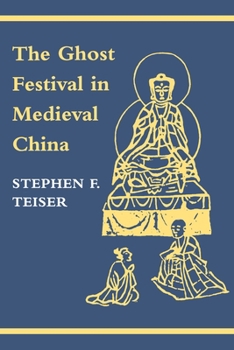The Ghost Festival in Medieval China
Select Format
Select Condition 
Book Overview
Largely unstudied until now, the religious festivals that attracted Chinese people from all walks of life provide the most instructive examples of the interaction between Chinese forms of social life... This description may be from another edition of this product.
Format:Hardcover
Language:English
ISBN:0691055254
ISBN13:9780691055251
Release Date:March 1988
Publisher:Princeton University Press
Length:296 Pages
Weight:1.05 lbs.
Dimensions:1.0" x 7.8" x 10.0"
Customer Reviews
4 ratings
One man's ancestor is another man's ghost.
Published by Thriftbooks.com User , 14 years ago
Students (of all ages) of Chinese culture and religion have at some point probably wondered how China reconciled some of the Indian roots of Buddhism with both Confucianism and China's own popular folk religions. Or conversely, why there seem to be Indian or Sanskrit elements in Chinese practices. This book, which is virtually a case study using the "Ghost Festival" (yulanpen in Pinyin), explains how. The Chinese have always, as far as we are able to determine, believed in ancestor worship, in the ties that bind an individual into a larger collective group identity (remember that the original purpose of all those bronze ritual vessels one sees in museums today was to hold the offerings one made to one's ancestors). Confucianism merely built upon this belief, elaborating a system based upon relationships between "seniors" and juniors" -- sometimes referred to as filial piety-- but extending beyond parents and children to emperor-subject, husband-wife, older brother-younger brother, older friend-younger friend. But such a structure was one of the biggest challenges Buddhism faced. How can you convince young men to leave their families to become monks when their role is to marry and bear more sons for a family? How can you teach families and villages the importance of feeding and supporting monastic communities even if it means forsaking the immediate needs of one's own family or village? You tell a convincing story. The story in this case was a ghost story, the story of a "filial" son (Mu-lien) who tries in vain by himself to save his mother, who by being ungenerous in spirit during her lifetime, has ended up in the deepest of hells (the Avici Hell) as a hungry ghost. It is through the intervention of the Buddha, and the monastic community that Mu-lien is able, in the end, to liberate her. The story of how he saves her, and the development of this very popular Chinese festival, is the story told in this excellent book, The Ghost Festival in Medieval China. How does the story of Mu-lien and the hells he finds link in with the 10 traditional hells of Chinese Buddhism today? What role does the bodhisattva Dizang play? What are the anguishes of hell? Are there paintings of hell in the Dunhuang caves? If you want to know how the Chinese reconcile "the two voices of the ghost festival--one expressing fear of ghosts, the other proclaiming admiration for ancestors"--read this book. My one criticism is that it should have been edited down into a less academic, more general volume, losing some of the repetitiveness and putting more of the academic details into foot or endnotes. Its current academic format will have assuredly lost it some readership when it deserves far more.
New Light on the Dark Regions
Published by Thriftbooks.com User , 17 years ago
This is the book that started a revolution in imagining the place of Buddhism in Chinese society. A compelling story and a great read. Shows how and why Buddhism mattered to Chinese people from all walks of life.
A vey good book about chinese buddhism history
Published by Thriftbooks.com User , 24 years ago
If you want know what's the meaning of Yu-lan-pen festival in Chinese Buddhism history and medieval China,you must read it....
Concise presentation of the ghost festival
Published by Thriftbooks.com User , 24 years ago
This is a very scholarly work, persumably written for students of eastern religion. In the Far East, where I am from, we simply observe the rites and rules of the festivals without quite knowning why. This book analyses in a very detailed manner the customs and particularly the myths that lie behind the festival. Much attention is lavished on the tale of Mulien who saves his mother from the underworld. This book will provide a comprehensive presentation of the topic, but I think it is aimed at academics rather than the general public.




